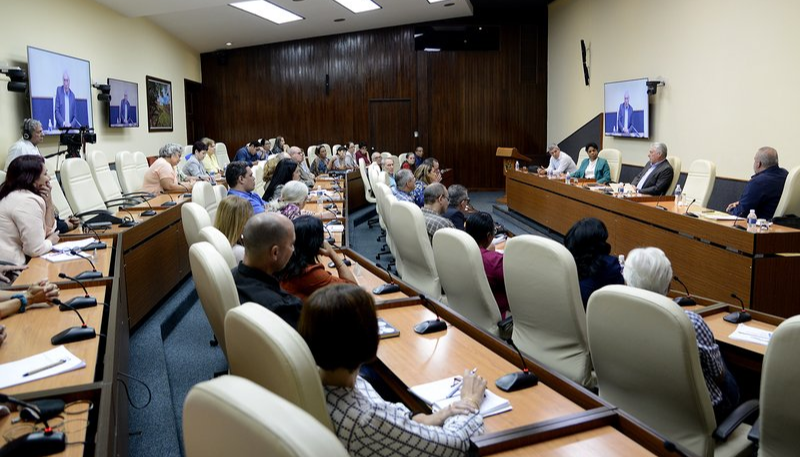
Diaz-Canel meets with Cuban experts and scientists. Photo: Estudios Revolución
Havana, January 11 (RHC)-- Cuban President Miguel Díaz-Canel Bermúdez presided over the usual meeting of experts and scientists on health issues on Tuesday afternoon, in which a review was made of everything undertaken during 2022 by Cuban science in the field of health.
The head of state told his interlocutors from the Palace of the Revolution: "Congratulations on the results. In any case, we cannot be confident; and we must go for more".
This happened right after the agenda item on "Science in health in Cuba in the year 2022. Challenges for 2023", whose presentation was given by Dr. Ileana Morales Suárez, Director of Science and Technological Innovation of the Ministry of Public Health (Minsap).
The Cuban President said that from the achievements made, from all that has been done, a substantial learning process is derived, consisting in the fact that "not in all the organizations of the country, nor in all the institutions, are we at the level -in terms of science and innovation- that we have in the Ministry of Public Health, and that we have in BioCubaFarma".
In his opinion, the high levels of development shown by those who have excelled in the task of defending health were what made it possible "to face a complex problem efficiently and effectively, such as COVID-19". And then he shared questions that directly gravitate on the wellbeing of Cubans:
"How do we transfer this? How do we grow in the rest of the areas of the country, with these results? How do we manage to build that awareness that we must go to scientific research, that we must go to innovation - which is precisely the purpose, the fundamental objective of the science and innovation system, which puts science and innovation as a pillar of Government Management?"
"How to achieve it?", insisted the dignitary in a meeting that also counted from the presidency with the Member of the Political Bureau and Prime Minister, Manuel Marrero Cruz; as well as Deputy Prime Ministers Inés María Chapman Waugh, and Jorge Luis Perdomo Di-Lella.
Díaz-Canel Bermúdez raised the questions because, as he also reflected, "we have other complex problems". He listed the food supply of the population; the environmental problems of the island; the economic development of the country -a challenge "that can be fragmented into a whole group of problems, and to which we also have to apply science and innovation"-.
"How do we turn this example, in the shortest possible time (the one carried out by Cuban science in the field of health), into something that is the rule and not the exception? He defined the topic as a learning that cannot be left out of hand; because "it is extremely eloquent how by making use of science and innovation we were able to face a complex problem (that of COVID-19), which today continues to be complex for the world".
The Cuban President reflected on the need to extend the success of our experts and scientists in the health universe to "other areas of the country's development", because Cuba is suffering from an intensified blockade, with income levels that do not meet the growing needs. Such reality, he reasoned, poses as a vital path the one of science and innovation, "which is the one that will give us other possibilities, other capacities".
What Cuban science has done in the field of health, the President said, is "an example of a chair" when it comes to innovation, because in that saga "there is intersectoriality, interdisciplinarity, comprehensive approaches, there are population issues addressed from the social sciences -not only from the medical sciences, nor only from genetic engineering-: here is almost everything that must be followed to achieve a chain of innovation in the attention to a complex problem".
On COVID-19, which is still "quite present" at the global level, the Head of State praised the ways in which Cuba chose "the approach of inclusive systems, of what is emancipatory". The pandemic, the dignitary reflected, called into question neoliberal thinking: with it "the gaps that existed between poor and rich countries were demonstrated", and the inadequacies of the planet's health systems came to light in all their crudeness.

